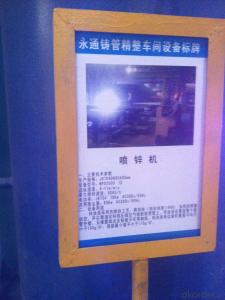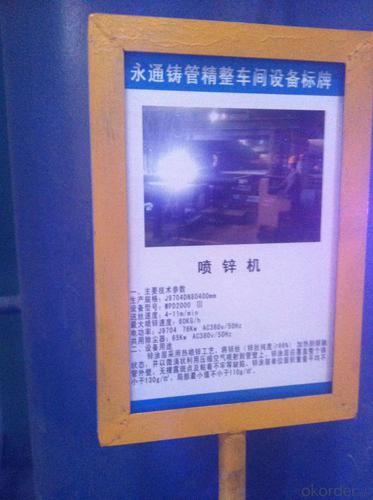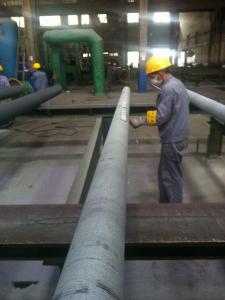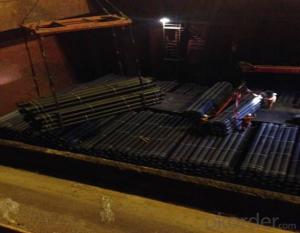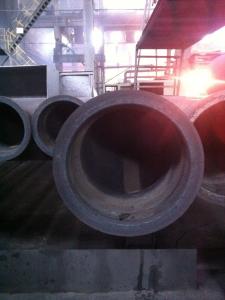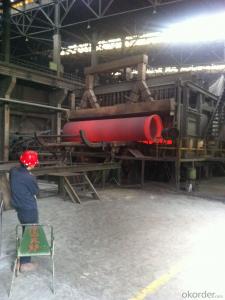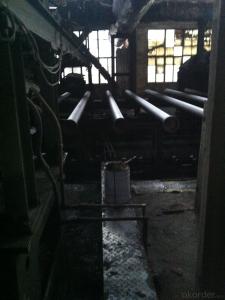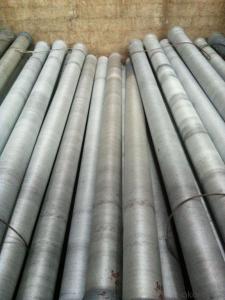DUCTILE IRON PIPES AND PIPE FITTINGS K9 CLASS DN700
- Loading Port:
- Tianjin
- Payment Terms:
- TT OR LC
- Min Order Qty:
- 22 pc
- Supply Capability:
- 3000 pc/month
OKorder Service Pledge
OKorder Financial Service
You Might Also Like
Material : Ductile Cast Iron
Size Range : DN 80mm to DN 2000mm
Unit Effective Length : 6m or 5.7m
Manufacture Standard: ISO 2531:1998/ EN 545:2006/EN 598:2007
Annual capacity : 200,000 tons
Coating Exterior: Zinc 130g/m2 according to ISO 8179-1 and bitumen coating 70 microns.
Cement Interior: Portland Cement/ High Alumina Cement/ Sulphate Resisting Cement Lining according to ISO 4179
Special requirements on external coating and internal lining can be applied
We also provide accessories such as SBR/EPDM rubber gaskets, lubricant paste, pipe caps, PE sleeves, etc.
Additional Parts:
Each pipe is strictly inspected according to related standard to ensure permanently high performance.
Easy Installation at site and service free for life
Long Service Lifespan
Quotation will arrive you within 24hours once we get your inquiry.
We guarantee offering you a competitive price.
A copy of original inspection reports of pipes will be offered after shipment.
Photos of loading process will be sent to the customer after shipment effect.
We will follow-up the delivery progress after shipment effect and update to the customer on weekly basis.
- Q: Are ductile iron pipes suitable for oil and gas pipeline applications?
- Indeed, oil and gas pipeline applications can benefit greatly from the suitability of ductile iron pipes. With a multitude of properties that make them ideal for such uses, ductile iron pipes are a wise choice. First and foremost, the high tensile strength possessed by ductile iron pipes enables them to effectively handle the immense pressure and stress associated with oil and gas transmission. This ensures their ability to withstand the rigorous conditions and maintain their structural integrity over time. Additionally, ductile iron pipes exhibit exceptional resistance to corrosion. Given that oil and gas pipelines are exposed to various corrosive elements, such as water, chemicals, and salts, ductile iron pipes are equipped with a protective lining, typically composed of cement mortar or polyethylene. This lining effectively combats corrosion and prolongs the lifespan of the pipes. Moreover, ductile iron pipes boast impressive durability and longevity. With a service life typically spanning from 50 to 100 years, depending on specific conditions and maintenance practices, they prove to be a reliable choice for oil and gas pipeline applications. Consequently, the need for frequent replacements is reduced, resulting in minimized downtime. Furthermore, the flexibility inherent in ductile iron pipes allows them to endure ground movement and absorb shocks and vibrations. This flexibility is especially crucial in oil and gas pipeline applications, where the pipes must adapt to ever-changing terrain and environmental conditions. Lastly, ductile iron pipes offer a cost-effective alternative to other commonly used materials in oil and gas pipelines, such as steel. Striking a favorable balance between performance and price, they emerge as a practical choice for pipeline projects of varying scales. In summary, the combination of high tensile strength, corrosion resistance, durability, flexibility, and cost-effectiveness renders ductile iron pipes highly suitable for oil and gas pipeline applications.
- Q: What are the common methods for cutting ductile iron pipes?
- Some common methods for cutting ductile iron pipes include using a handheld reciprocating saw with a metal-cutting blade, using a portable bandsaw, using a chop saw with a diamond-tipped blade, and using a pipe cutter specifically designed for ductile iron pipes. Additionally, some professionals may also use oxy-fuel or plasma cutting methods for larger diameter pipes.
- Q: How do ductile iron pipes perform in seismic zones?
- Ductile iron pipes perform well in seismic zones due to their inherent strength and flexibility. They are capable of withstanding ground movements and vibrations during seismic events without fracturing or breaking. The ductility of the material allows the pipes to absorb and distribute the seismic energy, reducing the risk of damage or failure. Additionally, their joint design and installation techniques ensure stability and integrity, further enhancing their performance in seismic zones.
- Q: Are ductile iron pipes suitable for railway crossings?
- Railway crossings can indeed utilize ductile iron pipes. Ductile iron, a robust and long-lasting material, finds extensive use in numerous applications, which include water and sewage systems. Its exceptional tensile strength and flexibility allow it to withstand heavy loads and vibrations, both of which are commonly encountered in the vicinity of railway crossings. Moreover, ductile iron pipes exhibit exceptional resistance to corrosion, making them particularly valuable in areas prone to moisture and exposure to diverse weather conditions. This resistance guarantees the pipes' durability, ultimately reducing the need for maintenance and replacement, thus cutting costs. Furthermore, ductile iron pipes are renowned for their effortless installation and versatility. They seamlessly integrate with other pipe types and fittings, facilitating their incorporation into the overall railway crossing infrastructure. However, it is important to bear in mind that the suitability of ductile iron pipes for railway crossings hinges on various factors, such as load requirements, soil conditions, and specific project specifications. Consulting engineering professionals and adhering to industry standards and regulations is vital to ensure the appropriate selection and installation of ductile iron pipes for railway crossings.
- Q: How is ductile iron different from cast iron?
- Ductile iron is different from cast iron in terms of its composition and mechanical properties. While both are types of iron alloys, ductile iron contains small amounts of additional elements, such as carbon, silicon, and magnesium, which enhance its strength, ductility, and impact resistance. This makes ductile iron more flexible and less brittle compared to cast iron. Additionally, ductile iron has a higher tensile strength and can withstand higher pressure and stress, making it suitable for applications where cast iron may fail.
- Q: Can ductile iron pipes be used for underground utilities?
- Underground utilities can indeed utilize ductile iron pipes. Renowned for their robustness, strength, and ability to withstand external pressure, ductile iron pipes prove to be a fitting option for subterranean applications demanding remarkable load-bearing capacity, such as utility installations. Furthermore, these pipes exhibit resistance to corrosion, a crucial attribute for underground environments that subject the pipes to dampness and soil conditions. Moreover, ductile iron pipes surpass alternative materials in terms of service life, thereby reducing the necessity for frequent replacements and maintenance. Consequently, ductile iron pipes find widespread application in underground utilities, encompassing water distribution, sewage systems, and gas pipelines.
- Q: What's the function of the cement mortar lining of ductile iron pipes?
- In brief, the cement mortar lining system has the following advantages:1. provide active protection better than barrier coating2. meet both national and international standards for contact with potable water3. can be used in the strict requirements of the occasion4. strong and shock resistant5. suitable for a wide range of applications6. easy to repair7. over 100 years of service life
- Q: What are the different sizes of ductile iron pipes available?
- Ductile iron pipes come in a range of sizes to meet different needs and purposes. Typically, the diameter of these pipes varies from 3 inches to 64 inches. This variety in sizes offers versatility and adaptability in various sectors such as water supply, sewage systems, irrigation, and industrial piping. Smaller ductile iron pipes, with diameters ranging from 3 to 12 inches, are commonly used for residential and small-scale purposes like household plumbing, fire hydrant systems, and small irrigation projects. These sizes are commonly found in urban areas and residential neighborhoods. For larger-scale applications, larger ductile iron pipes are employed. These pipes can have diameters ranging from 14 to 64 inches. They are primarily used in municipal water supply systems, wastewater treatment plants, and industrial facilities where there is a need for high-volume water flow. The wide array of sizes available in ductile iron pipes ensures that they can accommodate different flow rates and pressure requirements. This allows engineers, contractors, and designers to choose the appropriate size based on the specific demands of a particular project or application. To ensure the proper selection of ductile iron pipe size for a specific project, it is essential to consult industry standards, local regulations, and engineering guidelines. This ensures that the pipes meet the required performance standards and are suitable for the intended use.
- Q: Can ductile iron pipes be used for gravity flow applications?
- Yes, ductile iron pipes can be used for gravity flow applications. Ductile iron pipes are known for their strength, durability, and ability to handle high-pressure flow, making them suitable for various gravity flow systems such as sewage, stormwater, and water distribution networks.
- Q: How are ductile iron pipes protected against stray current corrosion?
- Ductile iron pipes are protected against stray current corrosion through the implementation of various measures. One common method is the installation of a protective coating, such as an epoxy or zinc coating, on the external surface of the pipes. This coating acts as a barrier, preventing direct contact between the pipe and the surrounding soil or water. Additionally, cathodic protection systems, such as impressed current or sacrificial anode systems, can be employed to further protect the pipes. These systems help to control and redirect stray currents, minimizing their impact on the ductile iron pipes and preventing corrosion.
Send your message to us
DUCTILE IRON PIPES AND PIPE FITTINGS K9 CLASS DN700
- Loading Port:
- Tianjin
- Payment Terms:
- TT OR LC
- Min Order Qty:
- 22 pc
- Supply Capability:
- 3000 pc/month
OKorder Service Pledge
OKorder Financial Service
Similar products
Hot products
Hot Searches
Related keywords
